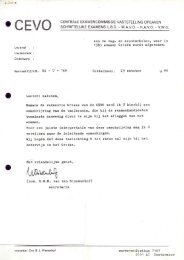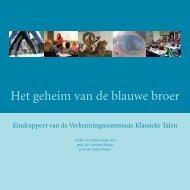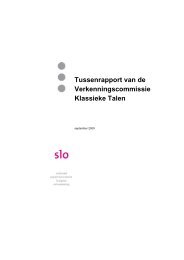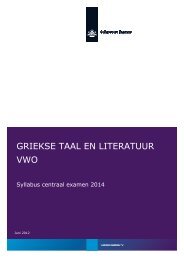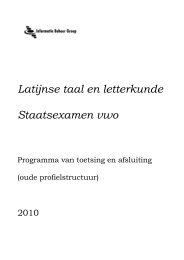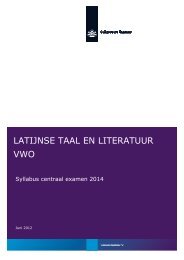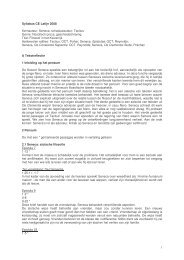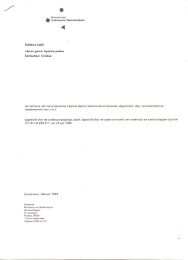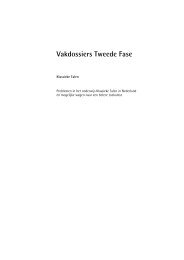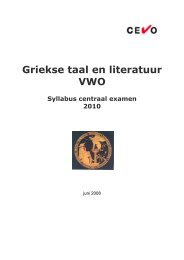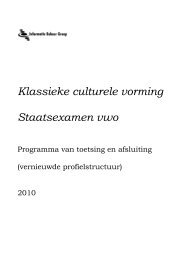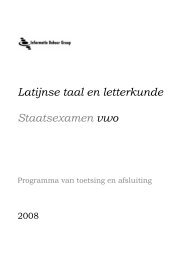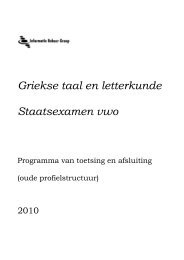Rome Wasn't Digitized in a Day - Council on Library and Information ...
Rome Wasn't Digitized in a Day - Council on Library and Information ...
Rome Wasn't Digitized in a Day - Council on Library and Information ...
Create successful ePaper yourself
Turn your PDF publications into a flip-book with our unique Google optimized e-Paper software.
160<br />
philology available at the website. M<strong>on</strong>tanari suggested that two types of digital tools had been created<br />
for philology <strong>and</strong> <str<strong>on</strong>g>in</str<strong>on</strong>g>deed for the humanities <str<strong>on</strong>g>in</str<strong>on</strong>g> general: (1) general electr<strong>on</strong>ic tools that were<br />
transformed to fit more specific needs; <strong>and</strong> (2) new tools that were created to meet unique dem<strong>and</strong>s.<br />
Accord<str<strong>on</strong>g>in</str<strong>on</strong>g>g to M<strong>on</strong>tanari, an <str<strong>on</strong>g>in</str<strong>on</strong>g>creas<str<strong>on</strong>g>in</str<strong>on</strong>g>g familiarity with digital tools will be required of all philologists:<br />
“The “new” classical scholar <strong>and</strong> teacher is supposed to be at home with this k<str<strong>on</strong>g>in</str<strong>on</strong>g>d of tools,” M<strong>on</strong>tanari<br />
asserted, add<str<strong>on</strong>g>in</str<strong>on</strong>g>g that “textual, bibliographical, <strong>and</strong> lexicographical databanks represent three of the<br />
most relevant electr<strong>on</strong>ic tools available thanks to the progress of digital technology.”<br />
The Aristarchus project, named after Aristarchus of Samothrace, <str<strong>on</strong>g>in</str<strong>on</strong>g>cludes a number of tools for<br />
philologists study<str<strong>on</strong>g>in</str<strong>on</strong>g>g the Greek <strong>and</strong> Roman world <strong>and</strong> has been created by the University of Genoa.<br />
The first tool, the “Lessico dei Grammatici Graeci Antichi” (LGGA) 520 or “Lexic<strong>on</strong> of Ancient Greek<br />
Grammarians,” provides a lexic<strong>on</strong> of ancient Greek scholars <strong>and</strong> philologists <strong>and</strong> provides an <strong>on</strong>l<str<strong>on</strong>g>in</str<strong>on</strong>g>e<br />
database that can be used to study the “history of ancient philology, grammar <strong>and</strong> scholarship.” In<br />
additi<strong>on</strong>, this website provides access to a sec<strong>on</strong>d “lexic<strong>on</strong>,” the “Catalogus Philologorum<br />
Classicorum” (CPhCL), 521 “an encyclopaedic lexic<strong>on</strong> that collects the biographies <strong>and</strong> the<br />
bibliographies of modern classical scholars.” The largest database is “Poorly Attested Words <str<strong>on</strong>g>in</str<strong>on</strong>g> Greek<br />
(PAWAG),” 522 which gathers together Ancient Greek words that have <strong>on</strong>ly been rarely attested <strong>and</strong> is<br />
described by M<strong>on</strong>tanari as a “half way house between a dicti<strong>on</strong>ary <str<strong>on</strong>g>in</str<strong>on</strong>g> the strict sense <strong>and</strong> an<br />
encyclopedic lexic<strong>on</strong>.” Two specialist websites have been created by Aristarchus:<br />
MEDIACLASSIC, 523 a “web site for didactics of the ancient Greek <strong>and</strong> Lat<str<strong>on</strong>g>in</str<strong>on</strong>g> languages”; <strong>and</strong><br />
“Scholia M<str<strong>on</strong>g>in</str<strong>on</strong>g>ora <str<strong>on</strong>g>in</str<strong>on</strong>g> Homerum,” 524 a site that provides an “up-to-date list<str<strong>on</strong>g>in</str<strong>on</strong>g>g, descripti<strong>on</strong>s, editi<strong>on</strong>s <strong>and</strong><br />
digital images of the so-called Scholia M<str<strong>on</strong>g>in</str<strong>on</strong>g>ora to the Iliad <strong>and</strong> Odyssey <strong>on</strong> papyrus.” Images of papyri<br />
can be viewed after registrati<strong>on</strong>. F<str<strong>on</strong>g>in</str<strong>on</strong>g>ally, the Aristarchus website hosts the Centro Italiano dell’Annee<br />
Philologique (CIAPh), 525 the Italian editorial office of the <str<strong>on</strong>g>in</str<strong>on</strong>g>ternati<strong>on</strong>al Année Philologique.<br />
Infrastructure for Digital Philology: The Teuchos Project<br />
While the BAMBI <strong>and</strong> the Aristarchus projects explored the use of digital tools, both projects def<str<strong>on</strong>g>in</str<strong>on</strong>g>ed<br />
philology <str<strong>on</strong>g>in</str<strong>on</strong>g> a fairly traditi<strong>on</strong>al manner, i.e., <str<strong>on</strong>g>in</str<strong>on</strong>g> terms of the type of work that would be performed. A<br />
more expansive def<str<strong>on</strong>g>in</str<strong>on</strong>g>iti<strong>on</strong> of philology was offered by Crane et al. (2009b): “Philology is thus not just<br />
about text; it is about the world that produced our surviv<str<strong>on</strong>g>in</str<strong>on</strong>g>g textual sources <strong>and</strong> about the tangible<br />
impact that these texts have had up<strong>on</strong> the worlds that read them.” To pursue a new level of ePhilology,<br />
the authors argued that a new digital <str<strong>on</strong>g>in</str<strong>on</strong>g>frastructure needed to be developed that brought together all<br />
relevant primary <strong>and</strong> sec<strong>on</strong>dary sources that are currently scattered <str<strong>on</strong>g>in</str<strong>on</strong>g> various specialized digital<br />
libraries <strong>and</strong> that provided background knowledge pers<strong>on</strong>alized to the needs of <str<strong>on</strong>g>in</str<strong>on</strong>g>dividual scholars. In<br />
additi<strong>on</strong>, new digital editi<strong>on</strong>s <strong>and</strong> commentaries need to ab<strong>and</strong><strong>on</strong> the limited assumpti<strong>on</strong>s of pr<str<strong>on</strong>g>in</str<strong>on</strong>g>t<br />
publicati<strong>on</strong>s (e.g., simply scann<str<strong>on</strong>g>in</str<strong>on</strong>g>g a pr<str<strong>on</strong>g>in</str<strong>on</strong>g>ted book rather than creat<str<strong>on</strong>g>in</str<strong>on</strong>g>g a true digital editi<strong>on</strong>), Crane et<br />
al. (2009b) reas<strong>on</strong>ed:<br />
We now face the challenge of rebuild<str<strong>on</strong>g>in</str<strong>on</strong>g>g our <str<strong>on</strong>g>in</str<strong>on</strong>g>frastructure <str<strong>on</strong>g>in</str<strong>on</strong>g> a digital form. Much of the<br />
<str<strong>on</strong>g>in</str<strong>on</strong>g>tellectual capital that we accumulated <str<strong>on</strong>g>in</str<strong>on</strong>g> the twentieth century is <str<strong>on</strong>g>in</str<strong>on</strong>g>accessible, either because<br />
its pr<str<strong>on</strong>g>in</str<strong>on</strong>g>t format does not lend itself to c<strong>on</strong>versi<strong>on</strong> <str<strong>on</strong>g>in</str<strong>on</strong>g>to a mach<str<strong>on</strong>g>in</str<strong>on</strong>g>e-acti<strong>on</strong>able form or because<br />
520 http://www.aristarchus.unige.it/lgga/<str<strong>on</strong>g>in</str<strong>on</strong>g>dex.php<br />
521 http://www.aristarchus.unige.it/cphcl/<str<strong>on</strong>g>in</str<strong>on</strong>g>dex.php<br />
522 http://www.aristarchus.unige.it/pawag/<str<strong>on</strong>g>in</str<strong>on</strong>g>dex.php<br />
523 http://www.loescher.it/mediaclassica/<br />
524 http://www.aristarchus.unige.it/scholia/<br />
525 http://www.aristarchus.unige.it/ciaph/<str<strong>on</strong>g>in</str<strong>on</strong>g>dex.php



